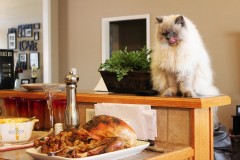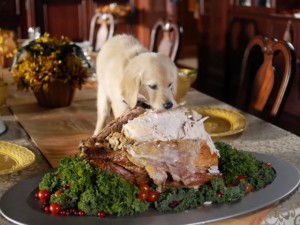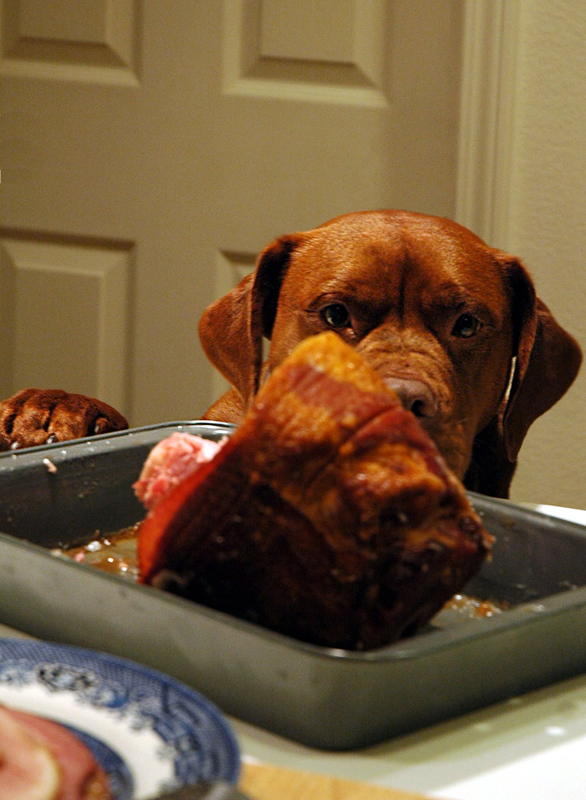Thanksgiving Pet Safety Tips

Thanksgiving – isn’t it just about everyone’s favorite food holiday? Food, family, and fun – what can go wrong for our pets?
A lot, as it turns out. Straying too far from your pet’s normal diet can cause problems. Thanksgiving “complications” that we commonly deal with here at VMC range from the mild to the severe. Unusual food items can simply cause some vomiting, diarrhea and tummy upset. Unfortunately, they can also cause much more serious problems.
Dietary Indiscretion (aka “Garbage Gut”): A very common reason for a trip to the VMC’s emergency room unfolds innocently in a busy holiday household. The meal is over and everyone is too full to pay attention to where the leftover food is in relation to your pets. Your pets have been waiting literally all day for such a chance, and are busily helping themselves to the overstuffed trash container and/or the leftovers on the counter. While dogs are usually the main offenders in cases of “garbage gut,” cats are not immune! Within a few hours some combination of vomiting and diarrhea requires a trip to the emergency room.
Pancreatitis: Pancreatitis is a swelling or inflammation of the pancreas. Severity can range from mild to life threatening. Pancreatitis is typically caused when our pets eat foods that are much higher in fat than their bodies are used to (think turkey skin, fat, and gravy). If your pet accidentally gets into Thanksgiving scraps (or if another family member sneaks them some!), watch for vomiting, diarrhea, signs of abdominal pain (your pet may appear “hunched up” if pain is severe enough), loss of appetite, weakness, or collapse. If you notice any of these signs, bring your pet to your family veterinarian or the VMC as soon as possible. If pancreatitis is left untreated, it can lead to severe liver and kidney damage and potentially be fatal.
Bones: Bones from the turkey carcass are a common hazard for your pet. Cooked bones are brittle and can act like sharp shards of glass when broken apart by chewing. Poultry bones can cause serious damage to the mouth and entire digestive system that can lead to internal bleeding, obstruction, and other serious problems. Some pets require surgery to remove the bones and/or to correct any damage that has been done.
Potential food dangers: Onions and/or onion powder are commonly used in stuffing and other dishes. Onions have the potential to destroy red blood cells in both cats and dogs, leading to anemia. Onions contain an ingredient called thiosulphate, which causes a condition called hemolytic anemia. Symptoms can take up to two to four days to appear and can include breathlessness, diarrhea, vomiting, and lethargy. Small amounts of onions can cause problems, so use caution when storing, serving, and disposing of these foods.
Grapes and raisins are also frequently used in Thanksgiving meals, and can be highly toxic to dogs. Any amount can cause acute kidney failure in dogs, and so are potentially deadly. If you suspect your dog has ingested any amount of grapes or raisins, contact your family veterinarian or the VMC immediately. The sooner treatment can start the better. Symptoms tend to present themselves a few hours after ingestion and include weakness, loss of appetite, increased drinking, and abdominal pain. Full kidney failure sets in within 48 hours of ingestion, so seek veterinary care as soon as you are aware your dog has eaten grapes or raisins. Not all dogs are affected, but the risk is so serious that it is best to avoid the chance altogether.
Making bread? Raw bread dough can expand in a pet’s stomach and require emergency surgery. Make sure that rising dough is well out of reach.

STAYING SAFE
Prevention! Every time your normal household routine is disturbed, opportunities for injury or illness can arise. Take some simple steps before your home erupts into happy holiday chaos so that you can relax and enjoy!
- Block your pet’s access to areas where food is stored openly on counters and tables. If you can’t supervise the area, make sure your pet can’t access it either.
- Talk to your guests about the risks, and ask that they honor a “no treats” rule to protect your pets. If your pet is used to lots of table scraps and changes in diet, a few treats here or there should be OK. Be aware, however, that if you have 20 guests and they are each giving “just a little bit” the amount can really add up quickly – especially for our small pets.
- Children will drop food. Your pets will eat it. Plan for that.
- Pets who are guests in households will not always act in the same way they do at home. Similarly, pets “hosting” other pets in their homes may also act abnormally. Extra vigilance is required!
- Ensure that trash bins are secure. Remember that the packaging the food came in will be just as alluring to your pet as the food itself. With larger than normal quantities of food in the house, proper disposal becomes more of a challenge.
- Expect the unexpected. We have treated very sick dogs after they have eaten things like mulch and stones outdoors because someone has cleaned the grill, dumped some turkey fat, cleaned out the turkey fryer, etc. The resulting “seasoning” on the mulch or stones is just irresistible to the dog. These cases almost always require surgical removal of those substances.
- Take time to observe your pet’s behavior. If the holiday festivities seem to be taking a toll, ensure that your pet has a quiet, secure space to rest in.

As always, be prepared – know where your closest emergency veterinary facility is located, just in case your pet needs care! Visit www.vmccny.com for directions and more information about our facility.
Above all, enjoy your family, your pets, and your holiday!
About Us
At Veterinary Medical Center of Central New York, we understand that the health of your pet is a top priority. In the case of an emergency or a condition requiring specialized care, we're here to treat your pet in our state-of-the-art, 24-hour Emergency and Critical Care Center.
